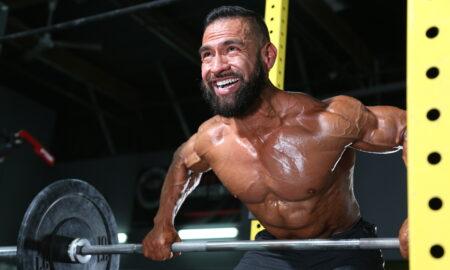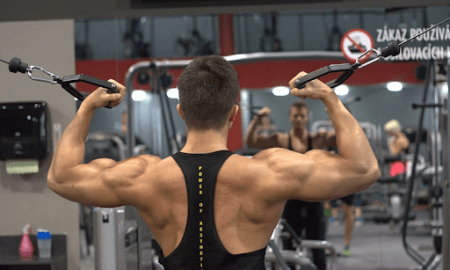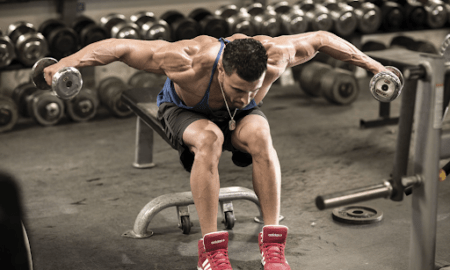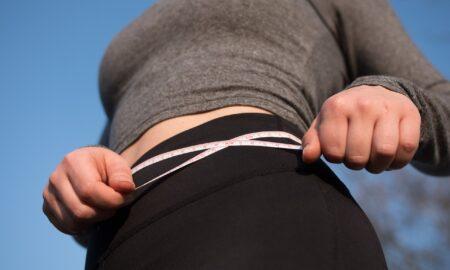Q: I saw an interview you did after the prejudging at the IFBB Masters World Championships in Poland. The last question the interviewer asked you was how, at 50 years of age, you could have the skin of a 20-year-old. You seemed to run out of time before you completely answered the question. So, do you have any secrets for having youthful-looking skin at your age? And congrats on your big win at the Masters World Championships. You’re quite an inspiration for us older guys. Keep doing what you’re doing.
A: Thank you very much. It was quite a thrill to win an IFBB World Championship. And thanks for keeping up with my career so closely and for reading IRON MAN.
Now to your question about youthful skin. The interview question caught me off guard, and I wasted time talking about my training longevity and my consistency. I do, however, think that both have something to do with how my skin looks. After I gave a somewhat drawn-out answer that didn’t fully answer the question, Paul asked me about staying lean in the off-season, and that’s part of the whole equation too.
I’ve been training very consistently now for more than 28 years. The longest I’ve ever been off is six weeks. The next-long-est stretch is two weeks. I think that’s relevant for two reasons. First, because I’ve always trained, I’ve never been out of shape. My weight has gotten a little out of hand—30 pounds above contest shape—on just two occasions. One of those years I had to buy a new pair of jeans because the ones I had were all too tight. When I had to purchase jeans that had a 32-inch waist, I was traumatized. My bodyfat came down so fast that those jeans were too big in less than two weeks.
So basically, I’ve never stretched my skin out much, and I never have to worry about whether it’s going to tighten up when I get down to contest shape. Second, because I’ve been so consistent, I haven’t had the hormone ups and downs that come with extended layoffs. I have always trained mainly with the basic exercises, so my growth hormone and testosterone stay elevated, and that keeps me looking younger (except for my hair).
Okay, now let’s get to things that deal directly with skin care.
Number one, I’m always very careful not to get burned. When tanning in a bed, I limit my exposure. When I have to start tanning for bodybuilding, I begin with about a third of the maximum bed time—for example, five minutes in a 15-minute bed. If I’m tanning a couple of times per week, I add a minute every two to three weeks. Even when I’m my darkest, I never go the maximum time. If I’m going to be out in the sun for more than 30 minutes, I use a light sunscreen (SPF 2 to 4). If I’m going to be out for more than an hour, I use a sunscreen with more SPF (usually 10 to 15). And if I’m going out on the lake for the day or to the beach, I use a sunscreen of 30 or higher. My skin is naturally very dark (thanks, Dad), so if you have a light complexion, you may have to use higher levels of sun protection than I do. The point is that you have to take precautions to avoid sunburn. Nothing ages your skin more quickly, not to mention dramatically increasing the risk of skin cancer.
Number two, I don’t smoke. With the exception of about half a year when I smoked one or two cigars per month, I’ve never been a smoker. I had to give up the cigars because I couldn’t get that taste out of my mouth for a good 24 hours, and it made my clothes stinky. It just wasn’t worth it. Regular smoking will accelerate the aging of your skin. I noticed at the IFBB Masters World Championships that most of the athletes who smoked appeared to be much older than they actually were. Don’t smoke. It’s bad for you.
Now, I think I mentioned in my interview that I take essential fatty acids regularly. I started taking EFAs about five years ago on the recommendation of Dr. Roberto D’Lorm, one of my clients. He recommended EFAs because I was suffering from joint and phantom muscle pains. He explained the beneficial anti-inflammatory effects of the EFAs as well as the effect of increased elasticity of muscle cells. He had done extensive research on EFAs when he was looking for relief from a severe form of eczema that had him bedridden for many months.
In the right combination EFAs promote skin elasticity and overall skin health. Dr. D’Lorm hugely credits EFAs with helping nurse his skin back to health. A side effect of taking them for my pain was that it dramatically improved the appearance of my skin. I highly recommend Muscle-Link’s Omega Stak to everyone. In addition to being good for your skin, joints and muscles, EFAs can improve your cholesterol profile. Taking Omega Stak dramatically increased my dad’s HDL, or good cholesterol, in a very short period of time.
Another important thing I learned about skin care from Dr. D’Lorm is to apply natural oils to your skin on a daily basis. He recommends using natural oils that do not contain any dimethicone—or any other methicone—as it can dry the skin, which is exactly what you don’t want. Dr. D’Lorm says to apply the natural oils immediately after showering, before you dry off, to get the best effect. That will help trap the moisture in the skin, and keeping the skin moisturized is the most important thing here. (I like Almond Glow by Home Health; www.HomeHealthUS.com.)
Dr. D’Lorm added that for skin health it would be best if we didn’t shower every day, as showering or bathing dries out the skin. As workout buffs, of course, we know that’s not really a good option. You can always tell which people in the gym don’t shower daily.
Lastly, I think the worst thing you can do for the appearance of both your skin and your muscles is to dehydrate yourself. I know that’s a time-honored practice in bodybuilding, but I think it’s a very bad thing. I’ve written about that a number of times, and many people just don’t buy it. People ask me how I get “that dry look.” It’s not dry; it’s extremely low bodyfat. I do admit that I dehydrate (and starve) myself for a day to make the welterweight class. As soon as I step off the scale, however, my girlfriend Diana is waiting nearby with a bottle of water. I rehydrate as quickly as I can.
I’ve said it many times: Your muscle is 73 percent water, and your blood is about 82 percent water. But did you know that your skin is about 70 percent water? Dehydrating yourself not only causes you to lose blood volume and muscle cell volume but also drains moisture from your skin, giving it an aged looked. Plus, when you lose muscle cell volume, your muscles just aren’t as big, which means your skin isn’t stretched as tightly. You end up with skin that is looser and more weathered looking. Don’t dehydrate. Train and diet to get the cuts you want.
For young, healthy-looking skin (kinda sounds like a lotion commercial, doesn’t it?) train consistently, don’t let your weight get out of hand (and stretch out your skin), don’t get sunburned, take your EFAs, apply a natural oil to your skin daily, and don’t dry yourself out. And don’t smoke.
The bodybuilding lifestyle should represent all-out optimal health. Although most people are more concerned about the appearance of their skin, the health of your skin is even more important, and the two go hand in hand. It’s never too early or too late to start taking care of your skin.
Train hard and eat clean.
Editor’s Note: See Dave Goodin’s blog at www.IronManMagazine.com. Click on the blog selection in the top menu bar.
To contact Dave directly, send e-mail to [email protected]. IM




















You must be logged in to post a comment Login